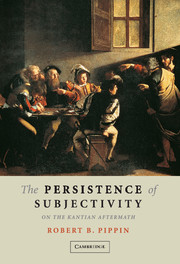Book contents
- Frontmatter
- Contents
- Acknowledgments
- The Persistence of Subjectivity
- 1 Introduction: “Bourgeois Philosophy” and the Problem of the Subject
- PART I SETTING
- PART II THEORISTS
- 3 Necessary Conditions for the Possibility of What Isn't: Heidegger on Failed Meaning
- 4 Gadamer's Hegel: Subjectivity and Reflection
- 5 Negative Ethics: Adorno on the Falseness of Bourgeois Life
- 6 The Unavailability of the Ordinary: Strauss on the Philosophical Fate of Modernity
- 7 Hannah Arendt and the Bourgeois Origins of Totalitarian Evil
- 8 On Not Being a Neo-Structuralist: Remarks on Manfred Frank and Romantic Subjectivity
- 9 Leaving Nature Behind, or Two Cheers for Subjectivism: On John McDowell
- Postscript: On McDowell's Response to “Leaving Nature Behind”
- PART III MODERN MORES
- PART IV EXPRESSION
- Bibliography
- Name Index
- Subject Index
9 - Leaving Nature Behind, or Two Cheers for Subjectivism: On John McDowell
Published online by Cambridge University Press: 05 June 2012
- Frontmatter
- Contents
- Acknowledgments
- The Persistence of Subjectivity
- 1 Introduction: “Bourgeois Philosophy” and the Problem of the Subject
- PART I SETTING
- PART II THEORISTS
- 3 Necessary Conditions for the Possibility of What Isn't: Heidegger on Failed Meaning
- 4 Gadamer's Hegel: Subjectivity and Reflection
- 5 Negative Ethics: Adorno on the Falseness of Bourgeois Life
- 6 The Unavailability of the Ordinary: Strauss on the Philosophical Fate of Modernity
- 7 Hannah Arendt and the Bourgeois Origins of Totalitarian Evil
- 8 On Not Being a Neo-Structuralist: Remarks on Manfred Frank and Romantic Subjectivity
- 9 Leaving Nature Behind, or Two Cheers for Subjectivism: On John McDowell
- Postscript: On McDowell's Response to “Leaving Nature Behind”
- PART III MODERN MORES
- PART IV EXPRESSION
- Bibliography
- Name Index
- Subject Index
Summary
Custom is almost a second nature.
(Plutarch, Rules for the Preservation of Health, 18)It is not difficult to imagine quite a credible narrative of the history of philosophy that concentrated mostly on the concept of nature and the various uses to which appeals to nature have been put. For many scholars, the idea that everything in the cosmos was intelligible in itself, that “what it was to be” anything was accessible to human reason as such, marked the origin of a distinctly philosophical approach, and “What is it?” or “What is its nature?” remained the question constantly close to the heart of the philosophic enterprise. All of this could be imagined while conceding that the variations in such appeals are very wide and the links between such uses sometimes difficult to make out.
Almost always, though, some great opposition is at stake and the use of the term is meant to distinguish and contrast. In the everyday sense, the contrast is between the familiar, what happens for the most part, what is expectable and normal, and what is uniquely unexpected, out of the ordinary, strange, “unnatural.” In early philosophical uses, the important contrasts are between “by nature” and “by art,” between physis and techne, and between nature and custom, physis and nomos. It is with Lucretius, and De rerum natura, that what would eventually become the great issue in modernity first appeared with clarity, even if in an undeveloped form: the claim that everything is natural, and natural in pretty much the same sense, and so all bound by the “bond of nature” (foedus naturae), including the unusual, the freakish, and even the instituting of, and changes in, human customs and laws.
- Type
- Chapter
- Information
- The Persistence of SubjectivityOn the Kantian Aftermath, pp. 186 - 205Publisher: Cambridge University PressPrint publication year: 2005
- 4
- Cited by



